Candidate experience in recruiting software developers. Part 2
- Transfer
Good afternoon. We are sharing with you the second part of the article on recruiting software developers, which is timed to coincide with the launch of the IT-Recruiter course . The first part can be read here .

The notification is attractive.
So, you went on your first date, and then ... nothing. Are you calling the next day to say you had fun? Are you waiting three days? Should you worry if you don’t want to mess with you? Everyone asks these questions when they meet, and no one loves them. It is much better to know exactly if the other person wants to see each other again.
Your developer wants the same, and yet communication statistics are ridiculous:
It is important to keep in touch with candidates, even if you have no changes. Here is a minimal list of events when something needs to be sent:
Better yet, put all your cards on this table. 83% of candidates said that this would significantly improve their “candidate experience” if employers provide clear interview dates. If you have planned your interview process correctly, you should have no problem telling candidates what to expect. This will help them understand the process and your decision.
All messages must be delivered in a timely manner, and some of them, for example, receiving an application, can be automated. This is an easy way to leave a developer with a good impression of your company. In fact, candidates believe that keeping track of application status in a timely manner is more important than a well-designed career site.
And this is also true for candidates who were rejected, apparently this is the majority of people going through the process. In the end, these developers may be well suited to work in the future, but you can ruin the relationship, because candidates who are not informed about the status of the application are 3.5 times less likely to apply to such a company again. Be transparent at every step of the process and inform punctually and honestly all your candidates.
Here is an example of an interview invitation. It is informative, without unnecessary information and tells the developer everything that is needed.
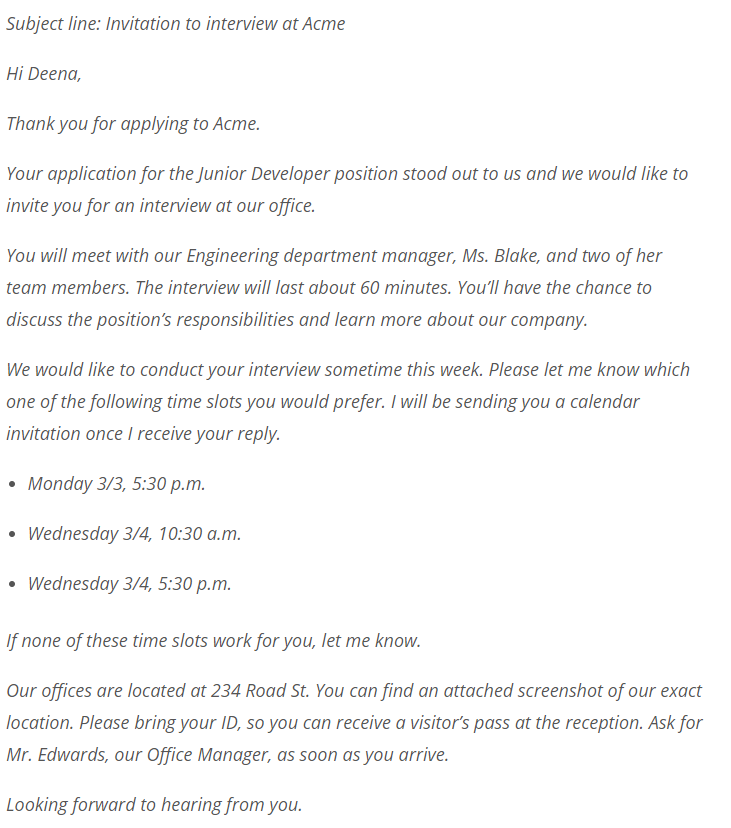
Source : Workable
Who of those present here did not have the slightest concern about meeting your partner's parents for dinner for the first time? Even if it all ends very well, there is always a fear that you will be coldly judged for three dishes and drinks.
The interview phase is no different from the fact that 17% of developers say that the interview process is one of the most annoying parts of the job. Even if you like the candidate, 65% will lose interest in the job if they had poor experience. And the most difficult thing is that it depends on you that the candidate does not feel like this:
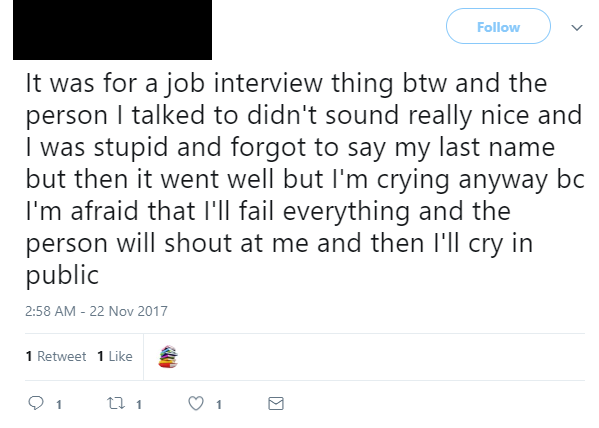
Source : Twitter
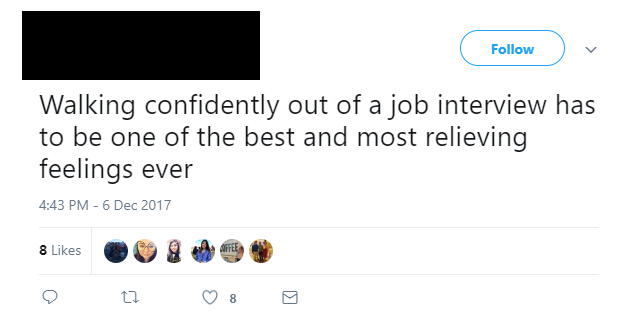
Source : Twitter
You will still need to objectively evaluate your candidates, but provide them with all the information you need to move forward. The best way to do this is to send them a guide before the interview containing information such as:
Technical Interviews
Typically, developer candidates need to go through several rounds of technical interviews to see if they have the right skills for the job. Although this is an unavoidable evil, it is important, on the one hand, to be effective, and on the other hand, to strengthen the fact that you are a serious company that understands the technology by which you are interviewing.
A great way for the first round is to give a task using technologies that developers will use if they get a job. This task can be sent to a large number of candidates in order to reduce the group that you invite for an interview. Candidates will appreciate this because it makes them understand what work they will do if they are accepted. In addition, this will save the expensive time of technical interviewers, as you can easily weed out anyone who does not meet the required threshold of technical skills before inviting for an interview.
Avoiding Interview Failure
During an interview, it is important to get to know the candidate and evaluate his suitability for the job. Patrick McCuller in his bookHow to Recruit and Hire Great Software Engineers: Building a Crack Development t (“How to Find and Hire Great Software Engineers: Building a Development Team”) describes what you should not do in an interview for a good candidate’s experience. He talks about the interview process, which included:
This experience showed that the company in which he interviewed did not know what he was doing, and made him warn his acquaintances from working there. On the contrary, if you are serious about the hiring process, testing developers on tasks similar to those on which they will actually work, they will have a good impression of your company. One of the biggest problems you can get into in this regard is the blackboard interview. It is popular in many companies, but candidates hate it because they do not feel that their abilities can be accurately assessed in this way. Comments similar to this:
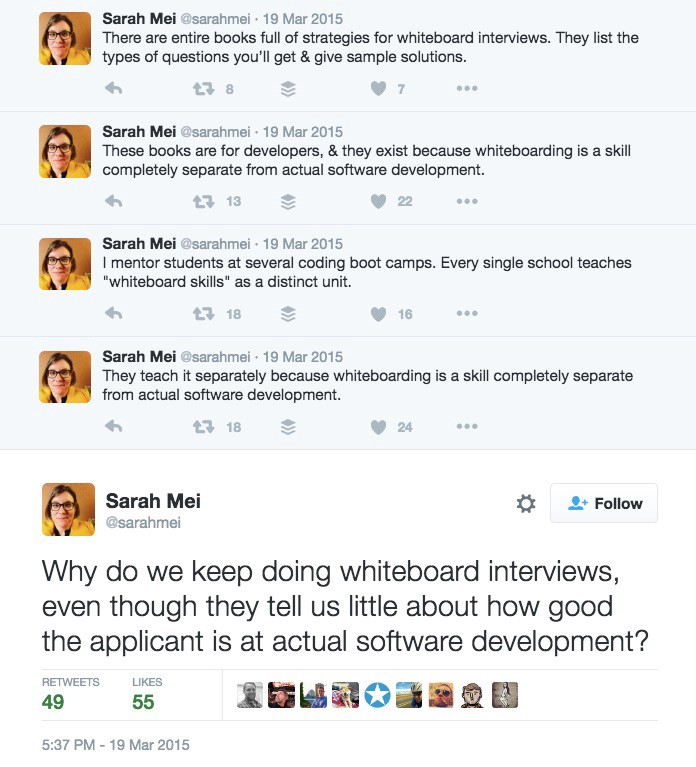
Source : Sara Mei via freeCodeCamp
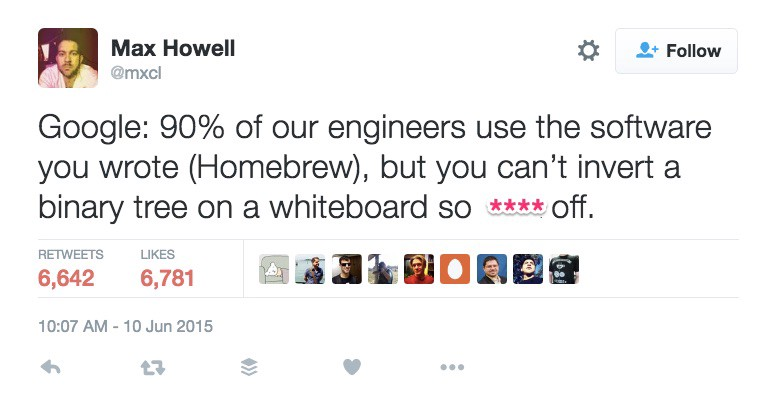
Source : Max Howell via freeCodeCamp
Other things you can do are be punctual , outgoing, and listen more than talk. Another positive step you can take is to introduce the developers to the team in which they will work - a practice that 47% of developers wantduring the interview. In the end, you should not hide anything, including your team.
Always ask for feedback
After your first date, would you not like to ask how you looked? Were you right in trying to be funny or should you be more romantic? The best way to get better next time is to find out what we did right or wrong before.
Although in our personal lives we are often not given the opportunity to find out how we looked, there are no reasons why we cannot give feedback in our professional life. In the end, we can be a little less emotional and a little more professional.
Despite the extensive information that we can get from our candidates, only every fourth employerregularly requests feedback from candidates about their impressions. This not only impedes your ability to improve candidate experience, but also supports a culture that discounts feedback. This means that three quarters of the candidates never received any request for feedback on the hiring process, in part because 75% did not know the person to request feedback.
By exchanging reviews, both parties become better at the hiring process and gain a positive impression of the other. As part of the interview or after the interview, tell the candidate where they can send feedback.
An easy way to evaluate a candidate’s experience is to ask: “On a scale of zero to ten, how likely is it that you will recommend this company as a potential employer?” The number you receive will be your eNPS (approx. Transl .: employee Net Promoter Score, net employee loyalty index), divided into Promoters (9-10), Skeptics (7-8) and Critics (0-6). The more Promoters you get, the better your process and the more benefits you will get from a good candidate experience.
Last thoughts
By hiring developers, you are trying to find the person with the best abilities and the right skills. Given the amount of effort you need to put in finding and testing, it is often easy to overlook the candidate’s experience. To simplify the task, we made a convenient checklist of the candidate’s experience. Use it to make sure that you do everything you need to ensure a good candidate experience every time a developer enters your “candidate pipeline”.
Providing the best admission process, you can attract the right people needed to grow your business.
The first part can be read here .

The notification is attractive.
So, you went on your first date, and then ... nothing. Are you calling the next day to say you had fun? Are you waiting three days? Should you worry if you don’t want to mess with you? Everyone asks these questions when they meet, and no one loves them. It is much better to know exactly if the other person wants to see each other again.
Your developer wants the same, and yet communication statistics are ridiculous:
- 50% of candidates do not receive a response after submitting an application, even recognizing that it has been received.
- The lack of a personal response within 24 hours reduces the likelihood that applicants will remain active candidates by 28% .
- 65% of candidates say that they never or rarely receive notification of a decision made on their application from the employer.
- Of those who receive notification, 51% say it takes 1 month or more.
- When they do not receive a response from employers, 85% of job seekers doubt that their application has been considered.
It is important to keep in touch with candidates, even if you have no changes. Here is a minimal list of events when something needs to be sent:
- Application received
- Application rejected
- Interview scheduled
- After interview / technical interview
- Offer
Better yet, put all your cards on this table. 83% of candidates said that this would significantly improve their “candidate experience” if employers provide clear interview dates. If you have planned your interview process correctly, you should have no problem telling candidates what to expect. This will help them understand the process and your decision.
All messages must be delivered in a timely manner, and some of them, for example, receiving an application, can be automated. This is an easy way to leave a developer with a good impression of your company. In fact, candidates believe that keeping track of application status in a timely manner is more important than a well-designed career site.
And this is also true for candidates who were rejected, apparently this is the majority of people going through the process. In the end, these developers may be well suited to work in the future, but you can ruin the relationship, because candidates who are not informed about the status of the application are 3.5 times less likely to apply to such a company again. Be transparent at every step of the process and inform punctually and honestly all your candidates.
Here is an example of an interview invitation. It is informative, without unnecessary information and tells the developer everything that is needed.

Source : Workable
Translation:The interview is worth showing.
Subject: Acme interview invitation
Hello, Dina. Thanks for contacting Acme.
We were interested in your application for the position of junior developer, and we would like to invite you for an interview at our office.
You will meet with the head of our engineering department, Miss Blake, and two members of her team. The interview will last about 60 minutes. You will have the opportunity to discuss responsibilities and learn more about our company.
We would like to conduct an interview this week. Please let me know which of the following time intervals would you prefer. I will send you an invitation on the calendar as soon as I receive your reply.
- Monday 3/3, 5:30 pm
- Wednesday 3/4, 10:30 am
- Wednesday 3/4, 5:30 pm
If none of these time slots is right for you, let me know.
Our offices are located at 234 Road St. You can find the attached screenshot of our exact location. Please bring your ID so that you can obtain a pass at the reception. Ask Mr. Edwards, our office manager, as soon as you arrive.
Looking forward to your reply.
Who of those present here did not have the slightest concern about meeting your partner's parents for dinner for the first time? Even if it all ends very well, there is always a fear that you will be coldly judged for three dishes and drinks.
The interview phase is no different from the fact that 17% of developers say that the interview process is one of the most annoying parts of the job. Even if you like the candidate, 65% will lose interest in the job if they had poor experience. And the most difficult thing is that it depends on you that the candidate does not feel like this:

Source : Twitter
Translation:And so:
It was at the interview, the person I was talking to didn’t sound very good, and I was stupid and forgot to say my name, but then everything went well, but I still cry, I'm afraid that I will fail, and they will shout at me, and then I will cry in public.

Source : Twitter
Translation:As at every stage of the process, transparency and informing your candidate will work in your favor and in their favor. In fact, 35% of developers said they want to be better prepared for the interview, and yet 40% of applicants receive nothing but time, date and place. It's simple enough, so why not help them?
Confidently completing an interview should be one of the best and easiest feelings.
You will still need to objectively evaluate your candidates, but provide them with all the information you need to move forward. The best way to do this is to send them a guide before the interview containing information such as:
- Time
- date
- Directions
- List of interviewees with their posts
- Expectations
- Potential appointments
- Testimonials from other employees
Examples of career paths
Technical Interviews
Typically, developer candidates need to go through several rounds of technical interviews to see if they have the right skills for the job. Although this is an unavoidable evil, it is important, on the one hand, to be effective, and on the other hand, to strengthen the fact that you are a serious company that understands the technology by which you are interviewing.
A great way for the first round is to give a task using technologies that developers will use if they get a job. This task can be sent to a large number of candidates in order to reduce the group that you invite for an interview. Candidates will appreciate this because it makes them understand what work they will do if they are accepted. In addition, this will save the expensive time of technical interviewers, as you can easily weed out anyone who does not meet the required threshold of technical skills before inviting for an interview.
Avoiding Interview Failure
During an interview, it is important to get to know the candidate and evaluate his suitability for the job. Patrick McCuller in his bookHow to Recruit and Hire Great Software Engineers: Building a Crack Development t (“How to Find and Hire Great Software Engineers: Building a Development Team”) describes what you should not do in an interview for a good candidate’s experience. He talks about the interview process, which included:
- Last minute change in interview time.
- Interviewers who are late.
- A large number of puzzles that had nothing to do with the job or the assessment of the candidate's skills and only allowed the interviewer to feel smart.
- An interviewer who asked questions about a job different from the one that was supposed to be interviewed.
- Lack of communication from a recruiter.
This experience showed that the company in which he interviewed did not know what he was doing, and made him warn his acquaintances from working there. On the contrary, if you are serious about the hiring process, testing developers on tasks similar to those on which they will actually work, they will have a good impression of your company. One of the biggest problems you can get into in this regard is the blackboard interview. It is popular in many companies, but candidates hate it because they do not feel that their abilities can be accurately assessed in this way. Comments similar to this:

Source : Sara Mei via freeCodeCamp
Translation:and this:
Sarah Mei sarahmei • 19 Mar 2015
There are whole books full of strategies for interviews on the board. They provide typical questions that you will be asked and examples of solutions.
Sarah Mei sarahmei, 19 Mar 2015
These books are intended for developers, and they exist because solving problems on the board is a completely different skill than real development.
Sarah Mei @sarahmei • 19 Mar 2015
I am a student mentor in several programming training camps. Each school teaches “blackboard skills” as a separate subject.
Sarah Mei sarahmei, 19 Mar 2015
They teach this separately, because solving problems on the board is a completely different skill, different from real development.
Sarah mei sarahmei
Why do we continue to conduct interviews on the board, although they tell us little about how good a candidate is in real software development?

Source : Max Howell via freeCodeCamp
Translation:are commonplace. Not only do bad methods, such as blackboard interviews, give you incomplete information, they give candidates the impression that your company does not know what it is talking about. Instead, use an interview in the form of joint programming or tests “first day at work”, as they better assess the capabilities of the developer and give them confidence in your competence as a company.
Google: 90% of our engineers use software that you wrote (Homebrew), but you cannot invert the binary tree on the board, so ***.
Other things you can do are be punctual , outgoing, and listen more than talk. Another positive step you can take is to introduce the developers to the team in which they will work - a practice that 47% of developers wantduring the interview. In the end, you should not hide anything, including your team.
Always ask for feedback
After your first date, would you not like to ask how you looked? Were you right in trying to be funny or should you be more romantic? The best way to get better next time is to find out what we did right or wrong before.
Although in our personal lives we are often not given the opportunity to find out how we looked, there are no reasons why we cannot give feedback in our professional life. In the end, we can be a little less emotional and a little more professional.
Despite the extensive information that we can get from our candidates, only every fourth employerregularly requests feedback from candidates about their impressions. This not only impedes your ability to improve candidate experience, but also supports a culture that discounts feedback. This means that three quarters of the candidates never received any request for feedback on the hiring process, in part because 75% did not know the person to request feedback.
By exchanging reviews, both parties become better at the hiring process and gain a positive impression of the other. As part of the interview or after the interview, tell the candidate where they can send feedback.
An easy way to evaluate a candidate’s experience is to ask: “On a scale of zero to ten, how likely is it that you will recommend this company as a potential employer?” The number you receive will be your eNPS (approx. Transl .: employee Net Promoter Score, net employee loyalty index), divided into Promoters (9-10), Skeptics (7-8) and Critics (0-6). The more Promoters you get, the better your process and the more benefits you will get from a good candidate experience.
Last thoughts
By hiring developers, you are trying to find the person with the best abilities and the right skills. Given the amount of effort you need to put in finding and testing, it is often easy to overlook the candidate’s experience. To simplify the task, we made a convenient checklist of the candidate’s experience. Use it to make sure that you do everything you need to ensure a good candidate experience every time a developer enters your “candidate pipeline”.
Providing the best admission process, you can attract the right people needed to grow your business.
Translator's note: to receive a checklist, you need to fill out the form at the end of theOn this publication came to an end. According to the established tradition, we are waiting for your comments and invite everyone to an open day at the IT-Recruiter course .
original article .
The first part can be read here .
